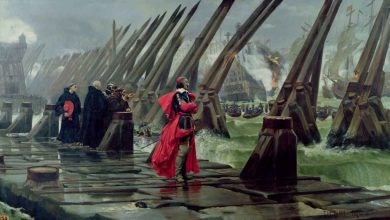On this day in 1741: the War of Austrian Succession

On this day in 1741, the War of Austrian Succession is begun in earnest, when Elector Charles Albert of Bavaria invaded Austrian territory.
Background to the Succession War
The Emperor Charles VI was technically the last Habsburg to live. The Spanish Habsburgs of the elder line of the Emperor Charles V went extinct following the death of Charles II of Spain in 1700. At the time the junior branch of the Emperor Ferdinand I was extent in the persons of the Emperor Leopold I and his sons Joseph and Charles. As the latter were still young, the dynasty seemed secure.

However, the Emperor Joseph I died not long after his father, in 1711 (Leopold died in 1705), leaving only daughters. The last male Habsburg thus became Emperor Charles VI, apparently Charles isn’t a lucky name for the dynasty. Charles failed to produce a male heir that survived infancy, and in 1740 he joined his father and elder brother in death. Prior to this, he promulgated the Pragmatic Sanction whereby he proclaimed his eldest daughter, the Archduchess Maria Theresa, and her husband Duke Francis Stephen of Lorraine, as heirs to all of his dominions.

The great Italian general in Austrian service, Prince Eugene of Savoy, advised his sovereign that a full treasury and a strong army were better guarantees than the Pragmatic Sanction, but unfortunately Charles’s arrogance and residual claims on the Spanish inheritance, lost to the French Bourbons upon the death of his cousin Charles II, entangled him in wars that exhausted his treasury and weakened his army. Though many of Europe’s states recognized the Pragmatic Sanction, Austria’s fragile state was not lost upon them. In quick succession the Austrians under Charles lost the War of the Polish Succession, and all of southern Italy with it, and the Turkish War of 1735-1739, which saw Austria lose territory in the Balkans to the Turks.
The Conflict Starts
Upon the death of the emperor in 1740, King Frederick II of Prussia claimed Silesia on account of dubious conditions of succession written long before. But as Prince Eugene had counselled, strength was better than legal arguments, and Prussia was soon master of Silesia. Prussia was the catalyst to spread the conflict. Already Spain was at war with Britain over the War of Jenkin’s Ear since 1739, and France was now determined to dismember her archenemy, the Austrian Empire.
The plan of France was hatched by the Duke de Belle-Isle, who proposed that a coalition of German states comprised of Bavaria, Saxony, and Prussia be invited to claim different parts of the Austrian patrimony, with Charles Albert of Bavaria receiving Austria proper based on the laws of succession of Emperor Ferdinand I, and as the closest living male heir of said emperor, being elected to the imperial dignity himself. For the first time since 1438, a non-Habsburg was elected to the imperial throne, Charles Albert becoming Emperor Charles VII of Wittelsbach.

French diplomacy also attempted to bring in the Kingdom of Sardinia in Italy, Poland, and the Ottoman Empire, and actually did bring in Spain, who was only too happy to strike another blow at their hated Austrian rivals. This grand coalition was effectively created in the winter and spring of 1741, and unleashed itself upon Austria on this day. The War of the Austrian Succession was a story of incredible endurance on the part of Austria, who survived intact and deflected her enemies on all sides despite starting the conflict bankrupt and disorganized.
Austria’s humiliating defeats between 1733 – 1739 and her chaotic internal situation seemed to guarantee the success of France’s scheme to eliminate the one power that could resist her power and thus perpetuate her own supremacy unchallenged. But with the help of the British and the Dutch, and the Sardinians who decided to help Austria in order to curb Spanish power in Italy, the Austrians prevailed. The only permanent loss they received, incredibly, was Silesia, all the rest of their pre-war territory being returned.
Importance of the war
The War of the Austrian Succession marked a turning point in European history. Henceforth there was to be a dualism in Germany, Austria was no longer indisputably supreme among the German states, Prussia had now risen to challenge her. More importantly, Austria had found her feet. The spectacular expansion under Leopold I and Joseph I betrayed Austria’s true strength, which was much less than it appeared. Austria had grown too far too fast, causing strategic overstretch.
She could not hold the Balkans beyond her mountain frontier, she could not hold southern Italy in the face of Spanish naval power, she could not hold Silesia which lay outside the Bohemian mountain complex, and she was incapable of protecting the Austrian Netherlands from France. But in her core territories, encircled securely by mountains, she consolidated herself and Maria Theresa with her husband the soon to be Emperor Francis I begun the reorganization of Austria that was to transform her. This work was continued by their eldest son Emperor Joseph II upon his accession in 1765. The dramatic rise of Austria in the 18th century is frequently overlooked, but the hinge turned in 1740.

In 1700 the Austrian Army stood at barely one-quarter that of France, and Austrian income was only around one-eighth that of France. The French Government was able to spend more money on the French Navy than the Austrian Empire counted for total revenue. Austria was a pygmy in comparison the might of France.
But between 1700 and 1790 the relative position of the two powers dramatically altered, and Austria by the time of Joseph II’s death had become the virtual equal of France in terms of power on land. France was to find that the flimsy Habsburg state of 1700 was impossible to destroy even in 1740, and infinitely more resilient by the time of Napoleon. Though they could hardly have guessed it, the French failure to destroy Austria in 1741 doomed their attempts to dominate Europe even at the height of Napoleon’s power.





